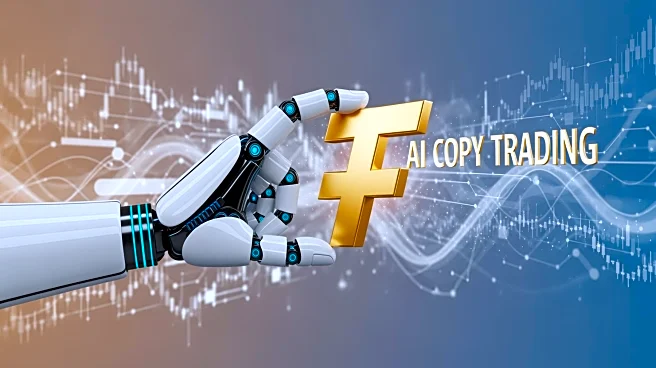What's Happening?
The forex trading landscape is undergoing a significant transformation with the integration of artificial intelligence (AI) into trading systems. AI is not just a futuristic concept but a competitive tool that enhances the precision and efficiency of forex trading.
According to a 2025 Statista projection, over 65% of global retail forex trades are now executed through algorithmic or automated systems. AI-powered copy trading platforms have made automation accessible to non-technical traders, shifting the market from manual to AI-driven trading. These platforms analyze trader performance, detect patterns, and adjust strategies based on probability and consistency, rather than mere replication. This evolution has led to the development of smarter forex bots that evaluate market conditions before executing trades, integrating deep-learning models and real-time data to refine their performance.
Why It's Important?
The rise of AI in forex trading represents a major shift in the financial industry, democratizing access to sophisticated trading strategies that were once exclusive to professional traders. This development could significantly impact retail investors by providing them with tools that enhance decision-making and risk management. AI-driven platforms offer transparency, control, and reliability, addressing long-standing issues of trust and accountability in retail investing. As these systems become more prevalent, they could lead to increased participation in forex trading, potentially boosting market liquidity and efficiency. However, the integration of AI also poses challenges, such as data reliability and regulatory ambiguity, which need to be addressed to ensure sustainable growth.
What's Next?
The future of AI in forex trading lies in the development of systems that combine adaptive AI with human-validated intelligence. This approach aims to create a trading ecosystem where technology and trader psychology work together, rather than in opposition. As AI models continue to evolve, they are expected to incorporate behavioral data and reinforcement learning, enabling them to adapt to volatile market conditions. Regulatory frameworks will need to evolve to address the accountability of AI-driven decision-making in trading. Platforms like SmartT are at the forefront of this movement, aiming to build ecosystems of shared intelligence that refine global models of profitable behavior.
Beyond the Headlines
The integration of AI in forex trading raises ethical and legal considerations, particularly concerning data privacy and the potential for market manipulation. As AI systems become more autonomous, ensuring transparency and accountability will be crucial to maintaining investor trust. The shift towards AI-driven trading also highlights the need for continuous education and adaptation among traders to leverage these technologies effectively. In the long term, the success of AI in forex trading will depend on its ability to enhance human judgment and decision-making, rather than replace it.















